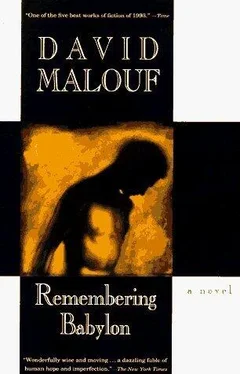It was always the same routine. He named the fruit as he plucked it, biting into the flesh or splitting it (the fig or apple as Mr Frazer called them) to show the pulp, or, if it was a berry, staining his mouth with its juice. Then he passed the thing to Mr Frazer, who sniffed, then warily, his mouth screwed up like an arsehole, tasted, and gave a smile as he savoured, or yowled and spat. Then he too tried the name on his tongue; took, as Gemmy saw it, a preliminary lick at the yam or tuber to reveal a streak of colour or test the roughness of its skin, as he himself had done, more vigorously, with his thumb. He did not often get it right. He did not open his mouth wide enough, or his tongue was in the wrong place or lolled about like a parrot’s, or he put too much spit into the thing or too little. Gemmy was glad that none of the clan were there to hear it.
To get a name wrong was comic but could also be blasphemous. In one case what emerged from Mr Frazer’s mouth was an old man’s testicle, in another, the tuber came out as a turd. Of course he understood immediately that he had botched the thing and after a good deal of trying amended it, but so scandalously on one occasion that Gemmy was shocked, and looked about fearfully, since the word Mr Frazer had hit upon was one the surrounding spirits should never have heard on a man’s lips, and he worried a little that some of these things might get into the book.
He was sensitive to this dealing between name and spirit. It was out of a kind of reverence, as well as concern for the danger he might put them in, that he concealed from Mr Frazer, who he knew would not notice, a good deal of what he himself could see. Things it was forbidden them to touch, since they were in the care of the men whose land they were crossing; others that only women could approach; others again that were a source of more power than he could control. They could have nothing to do with these things without creating a disturbance in the world that would do him, and Mr Frazer, and others too perhaps, irreparable injury.
So when he and the minister, half-crouching, pushed in under the overhanging boughs of a gully or trudged up a rocky, sun-scorched slope to where they could see, north and west, all the country he was at home in, he was moving through a world that was alive for him and dazzling; some of it even in the deepest shade throwing off luminous flares, so that he had to squint and cover his eyes, and all of it crackling and creaking and swelling and bursting with growth; but he cast the light only in patches for Mr Frazer, leaving the rest undisclosed.
Once or twice on these outings he saw blacks who were unfamiliar to him standing frozen in the brush, every muscle alert.
He made no obvious sign to them, none anyway that Mr Frazer would observe, since he knew the suspicions the white men had of him; but very gravely, in passing, acknowledged the watcher’s claim, and they accepted and let them pass.
On other occasions he saw nothing but felt the presence of watchers as a coldness at the base of his spine, a thickening of the darkness to one side of the track. Once again, he acknowledged them, whether they were there or not.
Mr Frazer saw nothing at all. Even when they were meant to be seen, he did not distinguish them from the surrounding vegetation or the play of light and shadow between the leaves. Puffing and singing odd little songs to himself, and fanning away flies, and calling Gemmy to notice this or that, he went barging through; and Gemmy did not enlighten him.
As for what the blacks would be seeing, Gemmy knew what that was. He himself would have a clear light around him like the line that contained Mr Frazer’s drawings. It came from the energy set off where his spirit touched the spirits he was moving through.
All they would see of Mr Frazer was what the land itself saw: a shape, thin, featureless, that interposed itself a moment, like a mist or cloud, before the land blazed out in its full strength again and the shadow was gone, as if, in the long history of the place, it was too slight to endure, or had never been.
‘OH, I WOULDNA’ concern yursel wi’ Gemmy. He’s hairmless.’
This was Jock McIvor to the little group of neighbours that on odd days gathered where three farms came together high on a slope; not by arrangement, it was never formal, but by an unspoken agreement that it was the sort of evening, at the end of a hard day, when a man might take a stroll uphill, have a smoke and see what was doing; in the harshness of their lives up here a point of easy fellowship and repose. He was making reply to a doubt his neighbour, Barney Mason, had expressed. It wasn’t a complaint — the code of friendship between them forbad that; rather, a long-standing anxiety on Barney’s part that was general but had recently, to Jock’s distress, found its focus in the white black man.
Gemmy had been with them for five months but Jock had not got used to him. When he had agreed that first afternoon to take the fellow in — in the confused excitement of the occasion, with the children noisily clamouring and his wife making silent appeal that just this once he might relax his strictness and indulge them — he had been acting against his own better judgment. He knew that and had gone right on and let the thing happen. He had done it out of embarrassment; because he did not want exposed before others a difference between Ellen and himself that was private, and which he felt she ought not to take advantage of.
He did offer a protest but it was a weak one. Their life was hard enough already; did they need a new addition to the household? ‘But Jock,’ she said quietly, ‘look at the puir creature! He’ll be nae trouble — Lachlan’ll see t’ him.’
He had made no further argument because the chief thing he had against the man was so unreasonable; he was ashamed of it.
From the moment he saw the fellow he had felt a kind of repulsion, a moral one he thought, though it expressed itself physically. Even now when he was used to having him about the place, and saw what a pathetic creature he was — how keen to make himself useful and how good with the children — he could not get past what he had felt on the first day, and so far as he could recall, at the very first sight of him hobbling down the gully with Lachlan driving him. He could not bear to have Gemmy come close to him. If he did, and tried to touch him, out of gratitude it might be for some small kindness, for he was very emotional, he would lose his head. ‘There’s nae ca’ for that, man — enough! For God’s sake, get off o’ me!’ Gemmy would look baffled. It was Ellen who had to step in and restore things. ‘A’richt, Gemmy, that’s enough, there’s a guid lad. Just step ootside, will ye, and fetch me an armful o’ wuid.’
So when he put Barney off with an assurance of Gemmy’s harmlessness he was being truthful in one way — there was no physical harm in him — but in a deeper way he was not.
He was a worrier, Barney. He was for ever gowling or greeting over one thing and the next. Though not much more than thirty, he wore a permanent dent in his brow, as if someone, years back, or some thing more likely, had let him have it with a slingshot; though it was also possible that the blow was still to come. Jock sympathised but had decided he could do most good by making light of Barney’s fears while admitting, secretly, they might be real.
Worrying out loud was Barney’s way of dealing with things. His own way was to clamp down hard and keep his troubles to himself. He wasn’t sure it was more effective than Barney’s, but it suited him. When Barney developed this bee in his bonnet about Gemmy he did not know how to save himself. He hated the difference it made between them, the looks of appeal Barney cast at him, and uncomprehending disappointment; even more that the constraint between them should be revealed when others were about. It was a shame. It spoiled things.
Читать дальше












